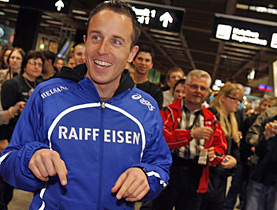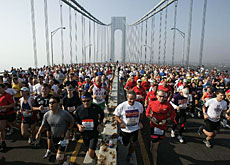“White Kenyan” aims to go the distance

Marathon runner Viktor Röthlin is one of the few genuine Swiss Olympic medal hopes. There is only one thing that could stop him: the Beijing smog.
When Röthlin crossed the finishing line at the Tokyo Marathon on February 17, he had won not only one of the world’s most prestigious city marathons, but had done so covering the 26.2 miles (42km) in the sensational time of 2:07.23 hours.
By running the second-best marathon time ever clocked by a European, Röthlin – from canton Obwalden – sent out a clear signal to his rivals from Africa and Asia that he, too, should be treated as a serious contender for an Olympic medal.
Röthlin’s impressive run – not the one in Tokyo this time, but his series of successes in marathons – stretches over seven years.
In 2001 he broke the 2:10 barrier and went on to better this time in 2004. However, his real breakthrough came in 2006 when he won silver at the European Athletics Championships in Gothenburg, which he followed up last year with bronze at the World Championships in Osaka.
The Olympic marathon on August 24 could be the race of his career. Aged 33, Röthlin is now at his peak. Having already competed in Sydney and Athens, Beijing will be his last Olympic Games.
“I always aim to run the perfect race. If I manage that, everything else takes care of itself. After European silver, bronze at the Worlds and winning the Tokyo marathon in such a great time, I have to believe in my chances in Beijing,” he told swissinfo.
What is more, Röthlin, a physiotherapist by profession, feels good about competing in Asia. “The positive vibes from doing so well in those two races in Japan will certainly give me a lift in Beijing,” he said.
Positive thinking
This mindset could indeed make all the difference for Röthlin, who is renowned for handling pressure and pulling it off on the day. After all, running a marathon at a major championship is totally different from running a city marathon where the prize money for the winners is often considerable.
By winning in Tokyo, Röthlin became a hero for millions of Japanese who take their marathons very seriously. “The adulation over there was unbelievable – I could barely go out on the streets anymore,” he reminisces.
When he arrived at the airport to fly back to Switzerland, he was literally fast-tracked through all the queues. “They didn’t even bother to put me in business or first class, but into a class above,” he beams. “It was certainly unusual!”
Were Röthlin Japanese, he would already be set up for the rest of his life. Yet the Swiss has always remained very down to earth, despite the way he glides over the asphalt. Amid all the hero-worship in Japan, he admits to being quite relieved when he eventually arrived back in the more tranquil surroundings he calls home.
Notable absentees
Another factor that could play in Röthlin’s favour in Beijing is that Ethiopian Haile Gebrselassie and Kenyans Paul Tergat and Martin Lel – all of whom would have been hot favourites – will not be competing.
But the Swiss would prefer not to focus on who might or might not be running against him until he takes the starting line on 24 August.
After all, he knows it will be a tough enough race even without these three stars. In his view, there are some 20 runners who are at the same level or better than him. Yet, ultimately, only three medals can be won.
In Beijing, athletes will not only have to contend with all the usual vagaries of a 26-mile course: the low air quality in the Chinese capital could also pose a serious problem. Neither Röthlin nor any of his rivals know for sure how much of an effect the air pollution, combined with the summer heat and high humidity, will have on their performance.
He intends to acclimatise himself to the heat and humidity by arriving in China in good time for the Olympics. But the smog remains the great unknown, as the human body is unable to adapt to it.
Röthlin will therefore again be relying on his mental strength to pull through. He is convinced that being in what he calls “the lion’s den” of Beijing for weeks before the Games can give him the psychological edge he needs.
Sky’s the limit?
Although this is set to be Röthlin’s last Olympic marathon, it is certainly not his last ever race over the classic distance.
After scaling ever-greater career heights in recent years, it is still unclear just how fast he can actually run. Röthlin, whose nickname is “the white Kenyan” owing to the considerable amount of time he spends training in the African country synonymous with distance running, prefers not to name a specific target time.
He believes that such hypothetical thinking would quickly result in a mental block. “If I keep saying to myself that 2:06 is possible, then I’ll definitely be able to run 2:06 – but no faster.”
What would he cherish the most: a 2:06 time or a medal in Beijing? “As the world’s greatest sporting event, the Olympic Games is the ultimate for every athlete,” he says. “An Olympic medal would mean a lot to me.”
Should Röthlin manage the race he has planned on the streets of Beijing, the hero status that has so far been reserved for him in faraway Japan will finally extend to his homeland.
swissinfo, Renat Künzi
Viktor Röthlin is currently Switzerland’s most successful track and field athlete.
Röthlin set a new Swiss record of 2:07:23 in February 2008 to become the second-quickest European marathon runner of all time.
In 2007 he won bronze in an exciting finish at the IAAF World Championships in Osaka.
The previous year he ran to a silver medal behind Italian Stefano Baldini at the European Athletics Championships in Gothenburg.
In 2004 he became the first Swiss to break the magical 2 hours 10 minutes barrier with a time of 2:09:55.
His first notable performance in an international race came in the 2001 Berlin marathon, where he finished eighth in a time of 2:10:54.
Röthlin has clocked eight of the ten best marathon times ever run by a Swiss athlete.
Heat, humidity and air pollution are some of the biggest challenges athletes will face at this year’s Olympics in Beijing. The risk of contracting diarrhoea and respiratory conditions is also particularly acute.
The Swiss Olympic Association (SOA) has therefore drawn up a set of guidelines for its competing athletes entitled “heat.smog.jetlag”, to enable them to prepare for the conditions in Beijing in the best possible way.
However, some SOA measures – such as asthma tests for all athletes prior to the Games – have led to criticism.
The recommended use of food supplements (creatine) and medication (melatonin to alleviate jet lag; salbutamol to ease respiratory complaints) have also been criticised.
Some athletes have suggested that what the SOA’s doctors are doing falls within a grey area of doping.

In compliance with the JTI standards
More: SWI swissinfo.ch certified by the Journalism Trust Initiative












You can find an overview of ongoing debates with our journalists here . Please join us!
If you want to start a conversation about a topic raised in this article or want to report factual errors, email us at english@swissinfo.ch.